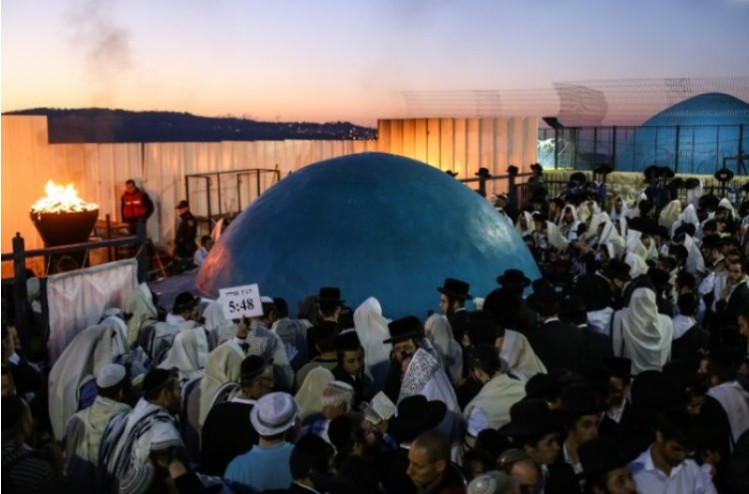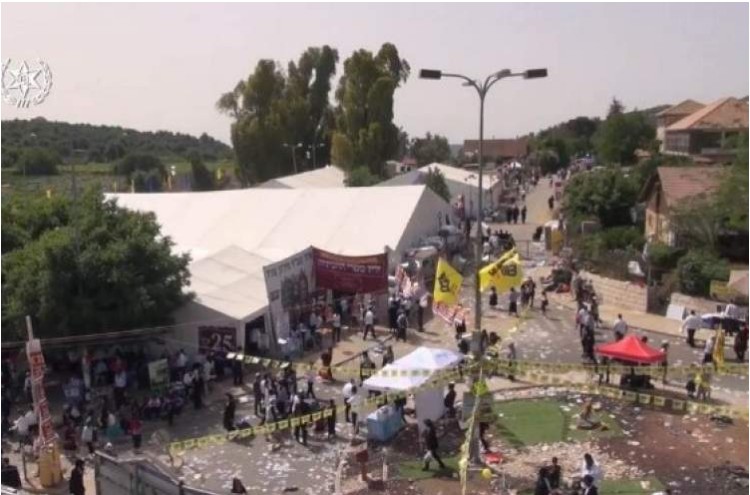Miri Zelikovich: "People Come from Afar, But I Can Always Visit Rabbi Shimon"
How does a woman feel opening her home during Lag BaOmer to hundreds of people? And what does it mean to have the privilege of being close to Rabbi Shimon's grave all year round? Miri Zelikovich, a resident of Meron, shares incredible experiences and unforgettable Lag BaOmer days.
 Miri's home on Lag BaOmer night
Miri's home on Lag BaOmer nightLag BaOmer is the day of the year when hundreds of thousands come to Meron, offer prayers at Rabbi Shimon's grave, and take advantage of the holy day of his yahrzeit. But there are some who are near Rabbi Shimon throughout the year. Such is Miri Zelikovich, who has lived in Meron for nearly 18 years.
What is Lag BaOmer like at your place?
"Lag BaOmer at our place is a day of endless hospitality," answers Miri. "It doesn't matter what the weather is or what the physical conditions are, people come and stay with us in any situation and nothing will stop them. The house loses all sense of time that day—from the moment Lag BaOmer begins till it ends. Family members and acquaintances come and go nonstop, using the bathroom, drinking something, or making other requests. The door is usually left wide open. Throughout the day, siblings, nephews, and friends take shifts on the mattresses scattered in the living room.
"Before Lag BaOmer, I take out all the blankets from storage. It's funny because my husband suggests every year to throw them away, but we end up keeping them. An enormous pile of blankets seems unusable, but eventually, we use every blanket and mattress available. Not a single blanket is left unused.
The Zelikovich family, like other families in Meron, also owns guesthouses rented out to visitors. "All year long, there's full occupancy, thank Hashem, but guests usually book months or even a year in advance for Lag BaOmer.
Aside from the many guesthouses around town, Miri says that on Lag BaOmer, all apartments and storage rooms are packed. "Personally, we have a medical equipment lending warehouse called 'Chasdei Shabtai.' On Lag BaOmer, we clear out all equipment, and the warehouse fills with blankets, mattresses, and pillows. Family, siblings, friends, and cousins come. Dozens stay in the warehouse, and during the day, we prepare large breakfasts and dinners."
Regarding the meals, Miri mentions that many people compete for the privilege to 'waitress,' as it is known to bring blessings, and it is said that those who serve Rabbi Shimon's guests on Lag BaOmer receive miracles. "We see these miracles up close repeatedly," she shares emotionally, "A few years back, a relative stayed with us on Lag BaOmer. She had been married for some years without children. Nine months later, she gave birth to a sweet daughter. In our first conversation to congratulate her, she reminded me of the waitressing on Lag BaOmer. It was clear to both of us that the blessing played a significant part."
Another custom on Lag BaOmer is distributing the well-known Chai Rotel—bottles of drink to Rabbi Shimon's guests. "One year, my father asked me to distribute Chai Rotel to visitors coming to Meron," shares Miri. "My father had a store in Jerusalem, which he closed but passed to new owners who didn't pay municipal taxes, so the city demanded payment from my father, amounting to tens of thousands of shekels. After distributing Chai Rotel, the city unexpectedly reduced the amount to only 5000 shekels. That year, a relative who participated in Chai Rotel had twins, and a dear brother-in-law who had been single for years got married."

Thanks to the Tzaddik
Miri notes that she witnesses divine intervention repeatedly, not only personally, but also among others who come to Meron. "One year, it was Friday before Shabbat Lag BaOmer," she recalls. "My son traveled in the morning to study at a Torah school in Tzfat. At that time, I didn't realize he was the only one who decided to go, as the other children in the village preferred staying home due to traffic. On the return trip, the driver decided to leave him at school because he wasn’t driving for just one child. Only after a long time did they call us to pick him up.
"We set out," continues Miri, "The traffic to Tzfat was, of course, difficult and exhausting, but the way back was surprisingly easier, as the road from Tzfat to Meron was completely empty—only Meron residents were allowed to enter. Suddenly, midway, we spotted a group of Americans standing with lots of luggage. We stopped, and it turned out they came straight from the airport and asked a taxi driver to take them to Meron. However, the police wouldn’t let him forward, so he dropped them off in the middle of the road, at Ein Zeitim, and left. They didn’t even realize what a miracle it was that we arrived, as they had no other way to get from there. We coincidentally arrived, and I'm not sure they’d have arrived for Shabbat otherwise."
And on regular days? How often do you visit Rabbi Shimon's tomb?
"Praying by Rabbi Shimon has become part of my life," Miri replies. "For instance, I don’t go into labor without stopping at Rabbi Shimon's first, even if the contractions are strong. There were some deliveries when I went to the tomb several times, each time thinking labor started, rushing straight to Rabbi Shimon.
"These days, as I'm pursuing a master’s degree, every time there's a test, on my way to class, I make a stop and pray. Before going abroad, it's understood that I'll stop by Rabbi Shimon to pray, and in daily life, I visit regularly. It’s a privilege. Each time I am reminded of this privilege when I see people coming from so far away, from all over the country and even abroad, while I’m blessed to be so close. I clearly need to utilize this."
Miri also recalls some particularly memorable prayers: "My sister once received a serious matchmaking proposal. My father set a meeting with the guy, and my sister asked me to pray at Rabbi Shimon's, asking that if it’s meant to happen, it should, and if not, it should vanish. After praying, I called to ask about the meeting, only to find out my father never met the guy—due to a clock switch, the guy confused the time. The match ultimately didn’t proceed, and later we understood why it was completely inappropriate. Eventually, salvation came from an unexpected direction."

She shares another exciting incident: "One day, I was driving into Meron and accidentally crossed a solid white line, right in front of the police, who stopped me and issued a fine of 1000 shekels and a three-month license suspension. Only those living in Meron understand how impossible it is to manage without a license. Just when they started writing the ticket, I prayed to Hashem, asking against all odds to be saved from this fine for the merit of Rabbi Shimon, promising to recite the entire Book of Psalms at Rabbi Shimon's grave if it happened.
"At that moment," continues Miri, "a guard at the entrance to the village, an Arab, came up and asked if he should talk to one of the officers, as he knew him. I didn’t give it much chance, since it was a solid line crossing, but I told him to try. He talked to the officer, explaining I’m a responsible person, acknowledging my mistake. Eventually, I only got a 250-shekel fine with no suspension. It was only due to Rabbi Shimon's merit; there’s no other explanation."
This year, the Zelikovich family plans a special gathering on Lag BaOmer night from 9:30 PM until 1 AM. “Rabbi Gurevitch from Migdal HaEmek will speak, and there will be a meal in honor of Rabbi Shimon’s yahrzeit for men. Of course, we invite everyone to continue sharing and discussing words of Torah at the Zelikovich home. On Waze, search for 'Chasdei Shabtai.'”

